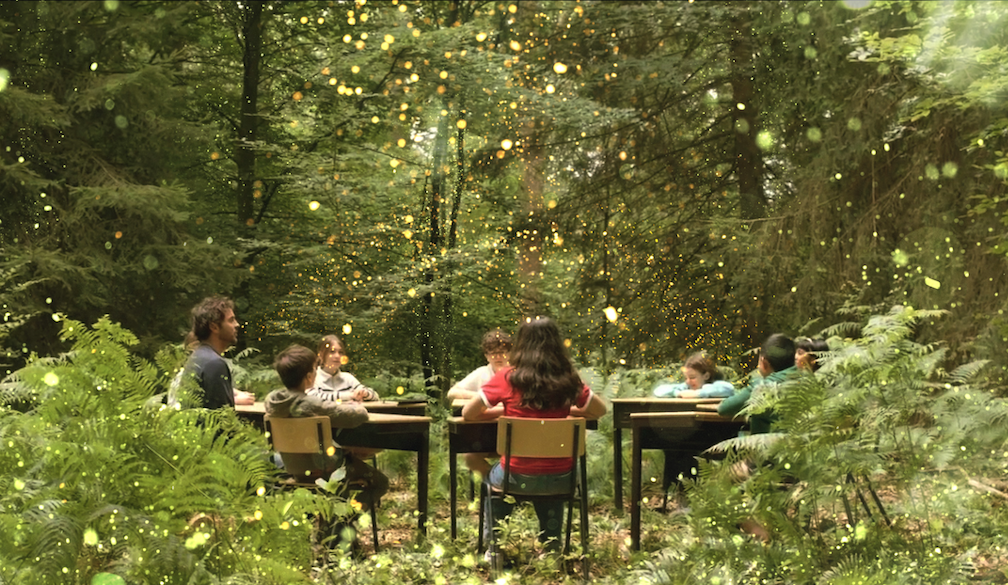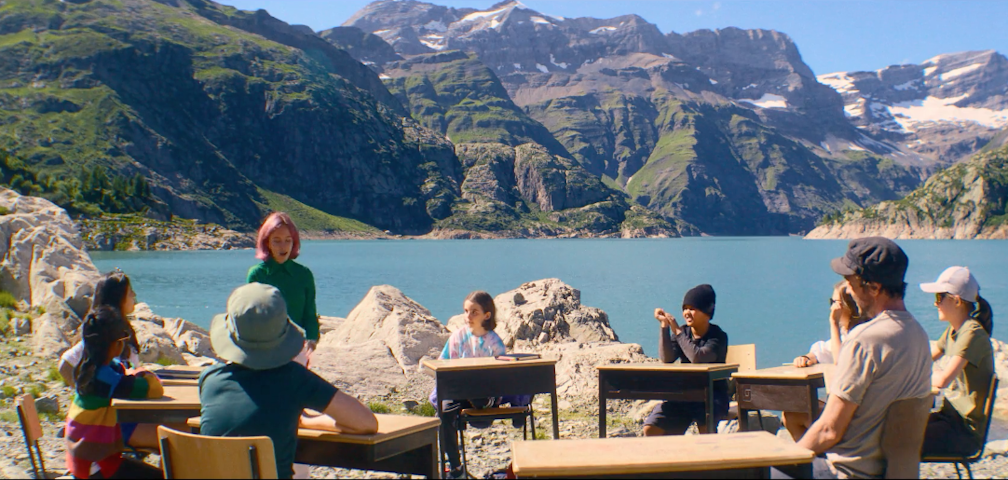Damon Gameau and other environmental filmmakers at Byron Bay Film Festival

Byron Shire filmmaker Damon Gameau is well known to audiences around the world for his artful cinematic studies of some of the contemporary threats to human health and survival in documentaries such as That Sugar Film, 2040, and Regenerating Australia.
Despite their alarming subject matter, Gameau’s films always offer something positive – a degree of faith in humanity’s capacity to face and even overcome its problems.
Nowhere is this more evident than in his latest work, Future Council, in which the rays of hope come in the form of eight clever and inquiring pre-teens from around the world, travelling with Gameau across Europe in a bright yellow vegetable-powered bus to visit ecological projects and meet the bosses of some of the world’s worst polluting companies (and make them squirm with their bold questions).
The kids’ intelligence, integrity and courage – and their enthusiastic co-operative efforts to find solutions to the challenge of survival in a climate crisis – make for heart-warming, and at times heart-rending, viewing.
There is also hope in the projects of the eco-minded individuals and groups they visit, and in the beauty of the forests and lakes they seek out and soak up – healing balm to their troubled young souls.
Above all, it is in the children’s thoughtfulness – the imagination and ambition they bring to the subject – that makes this such an uplifting film. It offers real proof of the cliched statement that ‘children are our future’ – our future councillors and counsellors, in fact.

Environmental focus at Byron Bay Film Festival
Byron Shire filmmaker Damon Gameau is well known to audiences around the world for his artful cinematic studies of some of the contemporary threats to human health and survival in documentaries such as That Sugar Film, 2040, and Regenerating Australia.
Despite their alarming subject matter, Gameau’s films always offer something positive – a degree of faith in humanity’s capacity to face and even overcome its problems.
Nowhere is this more evident than in his latest work, Future Council, in which the rays of hope come in the form of eight clever and inquiring pre-teens from around the world, travelling with Gameau across Europe in a bright yellow vegetable-powered school bus to visit ecological projects and meet the bosses of some of the world’s worst polluting companies (and make them squirm with their bold questions).
The kids’ intelligence, integrity and courage – and their enthusiastic co-operative efforts to find solutions to the challenge of survival in a climate crisis – make for heart-warming, and at times heart-rending, viewing.
There is also hope in the projects of the eco-minded individuals and groups they visit, and in the beauty of the forests and lakes they seek out and soak up – healing balm to their troubled young souls.
Above all, it is in the children’s thoughtfulness – the imagination and ambition they bring to the subject – that makes this such an uplifting film. It offers real proof of the cliched statement that ‘children are our future’ – our future councillors and counsellors, in fact.
Also future-focussed, and similarly uplifting, is the feature documentary, Wilding, based on English journalist Isabella Tree’s best-selling book of the same name. Wilding traces the 20-year mission of a couple of enlightened toffs to restore their 1400-hectare stately home’s farmland to health following centuries of use and abuse.
The land around Knepp Castle, in West Sussex, was ploughed and planted and drenched in chemicals to the point where its soil had become dirt, Tree says, and the farm only remained economically viable through government subsidies. She and her husband, Baronet Charles Burrell, decided that enough was enough, and followed a radical model of ‘rewilding’. They stocked it with ancient species of wild horse, cattle and, Tree’s favourite, pigs, whose rootling allowed the ground to return to a genuine viability, abundant with worms and 23 different species of dung beetle.
Tree and ‘Charlie’ are aristocrats but are also literally down to Earth, and their radical experiment made outsiders of them in their community. They became, says Tree, a pair of “lonely lunatics”, loathed by their neighbours.
There were other headaches too, including the spread over hundreds of acres of the noxious weed, creeping thistle. Instead of blitzing it with herbicides, the couple waited for nature to take its course and lo, when 11 million painted lady butterflies arrived from North Africa, their caterpillars ate the thistle to the ground, and it never returned.
Wilding’s story is full of these miraculous events, the wondrous capability of nature to right itself. The grand experiment became one of the most significant experiments of its type in Europe, and the estate today is a magnet for nature lovers, bird-spotters, enviro-tourists of every type.
In other BBFF screenings, we meet Byron Bay beekeeper Quinn Ingram-Arnold, 16, who is also a believer in letting nature take its course; despondent following annihilating floods, fires and diseases, he sought help from a local “bee whisperer” to understand how to protect his hives. His short film Trust the Bees tells how he learned to go with the flow.
Water and music flow together in Princess Daazhraii Johnson’s beautiful Gath & K'iyh: Listen to Heal, a poetic visual exploration of a community-led creative arts project in the Yukon, aimed at better understanding and restoring the people’s relationship with king salmon (gath) and k’iyh (birch). The film features Yo-Yo Ma and his cello, playing alongside community musicians and poets.
Turrakana Home, directed by Kristan Laemmle-Ruff, is set in similarly remote and rugged country, where the forest meets the wild southern ocean in lutruwita/Tasmania. A young girl immerses herself in the living world, acknowledges her intimate connection to Country and pays respect to the traditional custodians, leaving us with a simple message: look after the land and the land will look after you.
Fungi: Web of Life takes a similarly reverential approach to the natural world as it explores a great mystery we are only just beginning to unravel, the often-hidden world of fungi. Co-directors Gisela Kaufmann and Joseph Nizeti have created an astonishingly beautiful film about an extraordinary phenomenon. You will never view your garden or the forest floor the same way again.
These are just some of the environmental films on offer, and such a selection for its 18th year is nothing new for the Byron Bay Film Festival, which has shown a concern for environmental issues from the beginning.
As part of this long-standing commitment to environmental awareness and activism, the Festival is bringing Future Council to the Northern Rivers as part of its Schools Program, which aims to empower the region’s
youth to find their voice and take a stand. For High Schools, the program also features a curated selection of short films, both documentaries and dramas, designed to provide a fresh look at screen content, to resonate with students and spark meaningful conversations.
Schools across the Northern Rivers are invited to participate in the program, enriching their students’ screen appreciation and understanding of the world around them.
The 18th Byron Bay Film Festival runs from October 18-27 at Byron Palace Cinemas and other venues. Visit www.bbff.com.au for more information and tickets.
